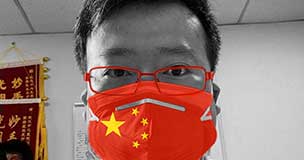Nathan Gardels is the editor-in-chief of Noema Magazine. He is also the co-founder of and a senior adviser to the Berggruen Institute.
The most famous dictum of Deng Xiaoping’s opening up and reform policies that led China from the impoverished Mao era to the top ranks of the global economy where it resides today, was to “seek truth from facts.” This was the great corrective to the Cultural Revolution when the doctrinal rigidity of “red” politics had triumphed over the pragmatism of “experts.” For Deng, a reality check that closed the distance between truth on the ground and the cover-up of the Maoists’ rosy ideological spin was the key to all else.
In the seven years Chinese President Xi Jinping has been in power, red politics has seen a big comeback. The logic behind this restoration is rooted in a misreading of the collapse of the Soviet Communist Party by Xi and his leadership circle, who are fearful of meeting the same fate. In their minds, if only Mikhail Gorbachev had not allowed the party’s reputation to lose its legitimacy by exposing its mistakes through glasnost, or transparency of the facts, it would remain in power today. They have thus wrongly concluded that the way to survive is to construct a narrative people are compelled to believe by seeking to control what they are allowed to know.
Paradoxically, as the growing public outrage over the clampdown and cover-up of the early warnings of the coronavirus outbreak in Wuhan now shows, China’s authorities are inviting the very Soviet fate they have sought to avoid. For Gorbachev, the authoritarian culture of secrecy, opacity and censorship that fatally delayed a response to the Chernobyl nuclear accident in 1986 marked the beginning of the end for the Soviet system. In China today, many on social media are already making this comparison with the coronavirus epidemic.
The dilemma every authoritarian system faces is that the assertion of total control and omnicompetence implies total responsibility. Anything that then goes wrong is a wounding chink in its armor, a stain on the prestige that underlies its claim to legitimacy, and thus the first impulse is to cover up.
The new element in today’s China that did not exist in Soviet times is the connectivity of social media. While China’s “Great Firewall” and legions of censors seem able to keep the relative handful of dissident voices under control, they are swamped by the swelling virality of public outrage such as we are now seeing, particularly around the death from the coronavirus of the Wuhan doctor, Li Wenliang, who was detained for “rumor-mongering” by expressing his early concerns online.
In the millennia-long history of its “institutional civilization” China has had a unitary state that never experienced the contest between religious and political authority, which gave birth to autonomous civil society in the West. The advent of social networks, fortified at successive moments of government failure such as the Sichuan earthquake in 2008, the Wenzhou high-speed train wreck in 2011 and now the Wuhan virus, is challenging that legacy.
Old systems of hierarchical control that for so long could impose an authoritative narrative may well be doomed, even in China, by the democratization of access to information. Just as the bourgeoisie created the space for civil society vis-à-vis royal absolutism in Europe, and just as women are today the makers of a democratic public sphere vis-à-vis theocracy and patriarchy in the Islamic world, so too social networks may well be the makers of autonomous civil society in China today.
In a conversation in Beijing in March 2015, Lu Wei, then China’s internet czar, acknowledged as much. In the absence of competitive elections, he told me, feedback through social media can be a necessary corrective on authority. In his view, China’s cybersphere — the Tiananmen Square of modern times — can balance the party while the party, in turn, must balance the cybersphere. For Lu, the issue was where to draw the line between “freedom” and “order.”
Clearly, in the case of the coronavirus, the line was drawn in the wrong place.
Even before the Wuhan outbreak, new ideas about how to govern China in a way that better balances freedom and order are beginning to sprout. In his recent book, “Against Political Equality: The Confucian Case,” philosopher Bai Tongdong, a former Berggruen Institute fellow, argues that “one person, one vote” democracy leads to the kind of populist demagoguery, disorder and inability to form a governing consensus we see across the West today. But, for all the reasons we’ve been discussing, he also argues for the robust rule of law and the protections of liberties and rights, including free expression.
Where this coronavirus episode leads is the big question now. Will Xi and the leadership finally realize the error of their misinterpretation of Soviet events and see greater transparency that revives “seeking truth from facts” as a way to improve responsiveness to public concerns? Or will he and his minions double down on cracking down? As climate change, the trade war and now this global public health emergency emanating from China make clear, the course Xi takes matter to us all.





